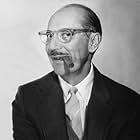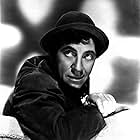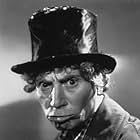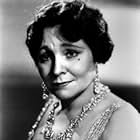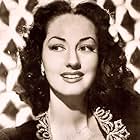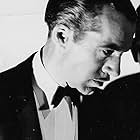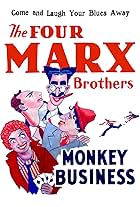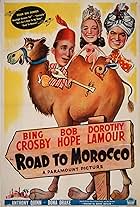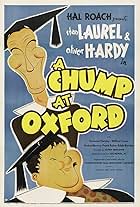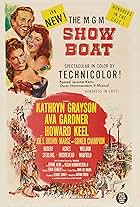ÉVALUATION IMDb
6,5/10
5,6 k
MA NOTE
Ajouter une intrigue dans votre langueA detective is hired to protect the life of a singer who has recently inherited a department store, from the store's crooked manager.A detective is hired to protect the life of a singer who has recently inherited a department store, from the store's crooked manager.A detective is hired to protect the life of a singer who has recently inherited a department store, from the store's crooked manager.
King Baggot
- Store Employee
- (uncredited)
Marvin Bailey
- Member - Six Hits and a Miss
- (uncredited)
Avis en vedette
After Zeppo Marx refused to move on with his brothers to MGM from Paramount, the Marxs usually secured the services of another player, usually a singer to function in Zeppo's nondescript place. Usually that person had a lot more personality than Zeppo did. It was Allan Jones in two films, Kenny Baker in one and in The Big Store it was Tony Martin.
The still very much alive, but retired Tony Martin, had one of the great voices of the last century. He never made the screen impact that other singers did, though he was in some very good films. His main media outlets were records, radio, and as one of the premier nightclub attractions, especially when he appeared with his second wife Cyd Charisse. Martin had two songs to sing in The Big Store, the much maligned Tenement Symphony and a really nice ballad, If It's You.
Martin is the heir to one half of Phelps Department store. The other half is owned by his aunt Margaret Dumont. The Hastings Brothers, who own a chain of department stores, are looking to buy this one.
Manager Douglass Dumbrille has been doing a little embezzling on the side and he's afraid that if Martin sells his half, he's taking a stretch up the river. After Martin becomes the victim of an attempted murder, Dumont hires who else, detective Wolf J. Flywheel who is of course Groucho Marx.
By a happy coincidence, Groucho has Harpo as a sidekick and Harpo's brother in the film Chico is a friend of Martin's. So now we have all the Marx Brothers working at the store.
The Big Store is usually dismissed as one of the Marx Brothers lesser films, but it's always been a favorite of mine. Another reviewer said there were too many musical numbers. I don't think there were any more or less than in other films of their's. The running time is a bit short so it might seem like there's more.
The highlight for me is always the final chase seen through the store, especially since Douglass Dumbrille joins in the fun. Dumbrille on screen usually plays some serious villains, probably his best known part is that of Mr. Cedar the lawyer who is milking the estate that Gary Cooper is inheriting in Mr. Deeds Goes to Town.
Dumbrille is just as successful dealing with the Marx Brothers over embezzlement as he is with Gary Cooper. But here this very serious and obviously classically trained actor joins right in the slapstick fun. Dumbrille looks like he's having a ball. Later on he would really cut loose in a couple of Abbott and Costello films.
A question to all movie fans. Who do you think had the most inventive screen character names, W.C. Fields or Groucho Marx?
The still very much alive, but retired Tony Martin, had one of the great voices of the last century. He never made the screen impact that other singers did, though he was in some very good films. His main media outlets were records, radio, and as one of the premier nightclub attractions, especially when he appeared with his second wife Cyd Charisse. Martin had two songs to sing in The Big Store, the much maligned Tenement Symphony and a really nice ballad, If It's You.
Martin is the heir to one half of Phelps Department store. The other half is owned by his aunt Margaret Dumont. The Hastings Brothers, who own a chain of department stores, are looking to buy this one.
Manager Douglass Dumbrille has been doing a little embezzling on the side and he's afraid that if Martin sells his half, he's taking a stretch up the river. After Martin becomes the victim of an attempted murder, Dumont hires who else, detective Wolf J. Flywheel who is of course Groucho Marx.
By a happy coincidence, Groucho has Harpo as a sidekick and Harpo's brother in the film Chico is a friend of Martin's. So now we have all the Marx Brothers working at the store.
The Big Store is usually dismissed as one of the Marx Brothers lesser films, but it's always been a favorite of mine. Another reviewer said there were too many musical numbers. I don't think there were any more or less than in other films of their's. The running time is a bit short so it might seem like there's more.
The highlight for me is always the final chase seen through the store, especially since Douglass Dumbrille joins in the fun. Dumbrille on screen usually plays some serious villains, probably his best known part is that of Mr. Cedar the lawyer who is milking the estate that Gary Cooper is inheriting in Mr. Deeds Goes to Town.
Dumbrille is just as successful dealing with the Marx Brothers over embezzlement as he is with Gary Cooper. But here this very serious and obviously classically trained actor joins right in the slapstick fun. Dumbrille looks like he's having a ball. Later on he would really cut loose in a couple of Abbott and Costello films.
A question to all movie fans. Who do you think had the most inventive screen character names, W.C. Fields or Groucho Marx?
Well, folks, this is the final nail in the coffin. This film marks the final collaboration between the World's Greatest Comedy Team and MGM studios - and it's a pretty sad epitaph. It's not the Marxes' fault - 'twas MGM that slew the boys (they also successfully neutered Laurel & Hardy, the b*******!). They relegated one writer to this and their two previous films, rather than a team of scribes and refused to let them try their material out live. Plus, it's clear the studio really didn't have a firm grasp on their characters: in this film, "At the Circus," and "Go West," they allow Groucho, Harpo, and Chico to become victimized. This would be unheard of during the Paramount years. Even when misfortune falls on the three in "A Night at the Opera" and "A Day At the Races," they come back even stronger, making their foes wish they'd never been born. The Marx Brothers aren't supposed to take s**t from anybody! Well, there's still a few good moments (the opening sequence of Groucho and Harpo trying to impress Margaret Dumont in their run-down detective office) but many of the scenes are pale retreads of great bits from earlier films (plus, it has the most repellent musical number ever featured in a Marx movie - "The Tenement Symphony"... yow! What a big, brown floater that is!). But, hey, even marginal Marx Brothers is better than most anything else I can imagine. If you've never experienced the Fab Four-then-Three before, don't start here - try "Duck Soup," "Horse Feathers," or "Monkey Business."
By 1941, Groucho didn't want to make any more movies. The Brothers continued to do so just to keep oldest Brother Chico afloat, due to his gambling habits.
Someone commented earlier about Virginia O'Brien, the deadpan singer in the "rockabye" sequence. The deadpan delivery was her "shtick", and predated a similar approach taken by Keely Smith some years later. Legend has it that the first time a spotlight fell on Ms. O'Brien for an on-stage solo, she froze, an delivered her song with a pre-Botox facial paralysis. The audience thought it was part of the act and roared approvingly with laughter. From then on, Ms. O'Brien sang no other way. (She also sings a few bars of the Jerome Kern song, "A Fine Romance" in the semi-bio, "'Til The Clouds Roll By".) The big store is best remembered (and viewed) for the rousing "Sing While You Sell" piece about 38 minutes into the movie.
Someone commented earlier about Virginia O'Brien, the deadpan singer in the "rockabye" sequence. The deadpan delivery was her "shtick", and predated a similar approach taken by Keely Smith some years later. Legend has it that the first time a spotlight fell on Ms. O'Brien for an on-stage solo, she froze, an delivered her song with a pre-Botox facial paralysis. The audience thought it was part of the act and roared approvingly with laughter. From then on, Ms. O'Brien sang no other way. (She also sings a few bars of the Jerome Kern song, "A Fine Romance" in the semi-bio, "'Til The Clouds Roll By".) The big store is best remembered (and viewed) for the rousing "Sing While You Sell" piece about 38 minutes into the movie.
Same old note: The Marx Brothers INGENIOUSLY twist any phrase or object into HILARITY.
Unfortunately, this film has a plot.
The usual hilarity when The Marx Brothers are left to their own devices, but too much screen time not dedicated to The Marx Brothers.
NOTE: If you have a heart-beat and love to laugh yourself silly, you MUST see Horse Feathers, Duck Soup, The Coconuts and Monkey Business.
Unfortunately, this film has a plot.
The usual hilarity when The Marx Brothers are left to their own devices, but too much screen time not dedicated to The Marx Brothers.
NOTE: If you have a heart-beat and love to laugh yourself silly, you MUST see Horse Feathers, Duck Soup, The Coconuts and Monkey Business.
Groucho Marx, in one of the interviews in Richard Anobile's book about the brothers, admitted that the films after the death of Irving Thalberg (he meant after A Day At The Races) were not his favorite, and he considered them the team's worst films. This is not a totally fair evaluation. Two of the films (Room Service and A Night in Casablanca) were as good as Horsefeathers or Animal Crackers. But it must be admitted that At The Circus, Go West, The Big Store, and Love Happy (not to say their unfortunate solo performances in The Story of Mankind)were below par Marx. All had good moments in them - but only moments. If one can cut these films to only highlight their highlights the resulting anthology film would be almost as good as Room Service and A Night in Casablanca.
Groucho is Wolf J. Flywheel in this film - one of his catchiest pseudonyms. Like his later, tamer film role as Sam Grunion in Love Happy, he is a detective. Like Grunion he is living a hand to mouth existance, owing rent. In the last moments of the film Charles Lane forcibly reposes his car, an ancient vehicle (for 1941 America) with the sign, "Welcome Admiral Dewey, Hero of Manilla" on the back - the battle of Manilla Bay was in 1898, and the car looks like it just arrived on the scene before Dewey died in 1917. Groucho is therefore definitely interested in impressing and romancing his normal foil, Margaret Dumont, for financial security. In the end they and Harpo are in the car as it is towed away.
It was not the first time that Groucho played a character named Flywheel. In the missing year of 1934, while he and his brothers left Paramount after Duck Soup failed (and when Zeppo decided to become an agent rather than a straight man - a wise decision as he was a very successful agent), Groucho and Chico made a series of radio programs about a firm of shyster lawyers, Flywheel, Shyster, and Flywheel. The tapes of these broadcasts no longer exist (apparently) but the scripts have been published. Many of their routines appear to have been used in these scripts, which are funny. One hopes the tapes will still manage to turn up one day.
The best moments in the film are those dealing with Groucho trying to impress Dumont, and his confrontations with Douglass Dumbrille, as the conniving, pompous store manager Grover. Harpo's fantasy moment with two other Harpos playing a trio is fine. Chico really does not do too well in the film - nothing in particular standing out. This is not enough to sustain the film, until the final ten minutes.
The brothers have photographed Grover paying two goons to assassinate Tony Martin (the heir to Dumont, the owner of the store - Dumbrille wants to marry her to get control of the store). Dumbrille tries to get the photo back, and chases the brothers through the deserted departments of the store.
Douglas Dumbrille was a recognizeable movie villain throughout the 1930s and 1940s. He appeared opposite Crosby and Hope in Road to Utopia, and opposite Abbott and Costello in Lost in a Harem. In such roles he usually just gave the normally competent straight dramatic villainy that he gave in such films as Treasure Island (he was Israel Hands, who tries to kill Jackie Cooper/Jim Hawkins). But it was different with the Brothers, as he appeared in two films with them. He had played Morgan, the racetrack owner in A Day at the Races. Dumbrille was not the only actor who played in several Marx Brother films - Walter Woolf King was Gasparri in A Night at the Opera and was one of the two villains in Go West. Sig Ruman was Herman Gottlieb in A Night at the Opera, Dr. Leopold X. Steimetz in A Day at the Races, and Hans Stubel (the Nazi War Criminal in hiding) in A Night in Casablanca. Margaret Dumont appeared in seven Marx films, and Thelma Todd in Horsefeathers and Monkey Business. Ruman, Dumont, and Todd were all expert comic actors, and perfect foils for the brothers. King was okay, but no more. But Dumbrille was the interesting repeater in the bunch.
In A Day at the Races, Dumbrille had little to do, except to threaten Harpo for not throwing a race, and looking apoplectic while the brothers demolish his racetrack to prevent a race from occuring before their missing horse can be found. As such, his performance there is little different from his performance in Road to Utopia or Lost in a Harem. But the conclusion of The Big Store is different. Here, he steals the chase from the stars of the film
It is true that by 1941 the brothers were too old for the stunts needed - and so they use doubles (compare it to Go West a year before, where they still do some of their own stunt work). In some of the tumbles Grover is supposed to take, one can see that Dumbrille has a double too. But the difference is that the director noted that Dumbrille's unsmiling, stiff face can be used to punctuate what a ridiculous figure he could become. For he does become ridiculous, despite the grave reason for his chasing the brothers. Suddenly he has to do such ridiculous things as ride a bicycle in the store (a kid's bike at that) while wearing his floorwalker outfit) to catch the brothers who are on skates. He puts on skates too at one point, and falls into a counter full of ladies hats. He disappears behind the counter, and raises his head to show he is wearing a lady's hat with a flower on top. It's a priceless image, for his expression has not changed.
It is Dumbrille who makes the forced chase worth watching - it was (perhaps) his finest moment as a comic actor. I wonder if the brothers (especially the critical Groucho) ever stopped to realize how they had briefly abdicated their movie to a supporting player.
Groucho is Wolf J. Flywheel in this film - one of his catchiest pseudonyms. Like his later, tamer film role as Sam Grunion in Love Happy, he is a detective. Like Grunion he is living a hand to mouth existance, owing rent. In the last moments of the film Charles Lane forcibly reposes his car, an ancient vehicle (for 1941 America) with the sign, "Welcome Admiral Dewey, Hero of Manilla" on the back - the battle of Manilla Bay was in 1898, and the car looks like it just arrived on the scene before Dewey died in 1917. Groucho is therefore definitely interested in impressing and romancing his normal foil, Margaret Dumont, for financial security. In the end they and Harpo are in the car as it is towed away.
It was not the first time that Groucho played a character named Flywheel. In the missing year of 1934, while he and his brothers left Paramount after Duck Soup failed (and when Zeppo decided to become an agent rather than a straight man - a wise decision as he was a very successful agent), Groucho and Chico made a series of radio programs about a firm of shyster lawyers, Flywheel, Shyster, and Flywheel. The tapes of these broadcasts no longer exist (apparently) but the scripts have been published. Many of their routines appear to have been used in these scripts, which are funny. One hopes the tapes will still manage to turn up one day.
The best moments in the film are those dealing with Groucho trying to impress Dumont, and his confrontations with Douglass Dumbrille, as the conniving, pompous store manager Grover. Harpo's fantasy moment with two other Harpos playing a trio is fine. Chico really does not do too well in the film - nothing in particular standing out. This is not enough to sustain the film, until the final ten minutes.
The brothers have photographed Grover paying two goons to assassinate Tony Martin (the heir to Dumont, the owner of the store - Dumbrille wants to marry her to get control of the store). Dumbrille tries to get the photo back, and chases the brothers through the deserted departments of the store.
Douglas Dumbrille was a recognizeable movie villain throughout the 1930s and 1940s. He appeared opposite Crosby and Hope in Road to Utopia, and opposite Abbott and Costello in Lost in a Harem. In such roles he usually just gave the normally competent straight dramatic villainy that he gave in such films as Treasure Island (he was Israel Hands, who tries to kill Jackie Cooper/Jim Hawkins). But it was different with the Brothers, as he appeared in two films with them. He had played Morgan, the racetrack owner in A Day at the Races. Dumbrille was not the only actor who played in several Marx Brother films - Walter Woolf King was Gasparri in A Night at the Opera and was one of the two villains in Go West. Sig Ruman was Herman Gottlieb in A Night at the Opera, Dr. Leopold X. Steimetz in A Day at the Races, and Hans Stubel (the Nazi War Criminal in hiding) in A Night in Casablanca. Margaret Dumont appeared in seven Marx films, and Thelma Todd in Horsefeathers and Monkey Business. Ruman, Dumont, and Todd were all expert comic actors, and perfect foils for the brothers. King was okay, but no more. But Dumbrille was the interesting repeater in the bunch.
In A Day at the Races, Dumbrille had little to do, except to threaten Harpo for not throwing a race, and looking apoplectic while the brothers demolish his racetrack to prevent a race from occuring before their missing horse can be found. As such, his performance there is little different from his performance in Road to Utopia or Lost in a Harem. But the conclusion of The Big Store is different. Here, he steals the chase from the stars of the film
It is true that by 1941 the brothers were too old for the stunts needed - and so they use doubles (compare it to Go West a year before, where they still do some of their own stunt work). In some of the tumbles Grover is supposed to take, one can see that Dumbrille has a double too. But the difference is that the director noted that Dumbrille's unsmiling, stiff face can be used to punctuate what a ridiculous figure he could become. For he does become ridiculous, despite the grave reason for his chasing the brothers. Suddenly he has to do such ridiculous things as ride a bicycle in the store (a kid's bike at that) while wearing his floorwalker outfit) to catch the brothers who are on skates. He puts on skates too at one point, and falls into a counter full of ladies hats. He disappears behind the counter, and raises his head to show he is wearing a lady's hat with a flower on top. It's a priceless image, for his expression has not changed.
It is Dumbrille who makes the forced chase worth watching - it was (perhaps) his finest moment as a comic actor. I wonder if the brothers (especially the critical Groucho) ever stopped to realize how they had briefly abdicated their movie to a supporting player.
Le saviez-vous
- AnecdotesSeventh and final film teaming of The Marx Brothers with Margaret Dumont.
- GaffesObvious doubles for the main characters during the finale chase sequence (except for close-ups).
- Citations
Mr. Grover: What experience have you had at a department store?
Wolf J. Flywheel: I was a shoplifter for three years.
- ConnexionsFeatured in Classic Comedy Teams (1986)
- Bandes originalesTenement Symphony
(1941)
Music by Hal Borne
Lyrics by Sid Kuller and Ray Golden
Sung by Tony Martin (uncredited) and St. Luke's Episcopal Church Choristers (uncredited),
with Chico Marx (uncredited) and Harpo Marx (uncredited)
Meilleurs choix
Connectez-vous pour évaluer et surveiller les recommandations personnalisées
- How long is The Big Store?Propulsé par Alexa
Détails
- Durée1 heure 23 minutes
- Couleur
- Rapport de forme
- 1.37 : 1
Contribuer à cette page
Suggérer une modification ou ajouter du contenu manquant

Lacune principale
By what name was The Big Store (1941) officially released in India in English?
Répondre








